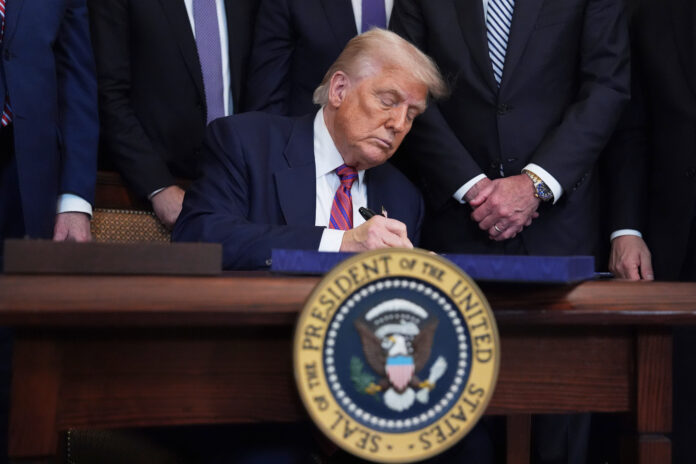- President Trump signs the GENIUS Act, enabling banks to issue stablecoins and boosting crypto industry growth. This marks the first time Trump signs major law related to cryptocurrency.
- The law faces criticism over potential conflicts of interest due to Trump family ties to a crypto company benefiting from it. Nonetheless, Trump signs first major law with significant implications for the financial sector.
- Lawmakers and public remain divided, debating regulation strength, consumer protection, and risks of anonymous transactions.
In a move that marks a turning point for the digital currency world, President Donald Trump signed the first major federal cryptocurrency bill into law last Friday. Trump signs first major law in the cryptocurrency domain, as the legislation aims to open doors for banks to issue stablecoins—digital currencies pegged to stable assets like the U.S. dollar—paving the way for broader acceptance and trust in the crypto market.
The legislation, known as the GENIUS Act, passed the House of Representatives just a day before Trump put pen to paper. It sailed through the Senate last month with bipartisan support, reflecting the growing recognition in Washington of cryptocurrency’s expanding role in the economy. Trump, who had once been skeptical of crypto, now portrays himself as a champion for the industry, calling it “a very powerful” sector where America must maintain leadership.
Trump’s New Crypto Image: From Skeptic to Superstar
It’s remarkable how quickly Trump’s stance on cryptocurrency has shifted. Once cautious, the former president has embraced the digital currency world with surprising enthusiasm. Earlier this year, he even launched his own meme coin, further cementing his position as the most crypto-friendly president the U.S. has ever seen. With Trump signing his first major law related to crypto, the landscape is continuously changing.
During the bill signing, Trump proudly declared, “I pledged that we would bring back American liberty and leadership and make the United States the crypto capital of the world. And that’s what we’ve done under the Trump administration.” His message clearly signals a vision for the U.S. as a dominant force in this emerging market, a sector often viewed as risky and volatile by traditional financiers.
What Are Stablecoins and Why Do They Matter?
Stablecoins are a special breed of cryptocurrency. Unlike Bitcoin or Ethereum, whose values swing wildly, stablecoins maintain a steady value by pegging themselves to stable assets, usually the U.S. dollar. This makes them a preferred entry point for many who want to dabble in crypto without facing wild price swings.
The GENIUS Act aims to simplify the process for banks and other financial institutions to issue these coins, which in turn should build greater trust among everyday users. Typically, consumers use their bank accounts to buy stablecoins, then trade those coins for other, more volatile cryptocurrencies. By making it easier for banks to participate, the bill hopes to drive wider adoption and boost confidence in the system.
Political Drama Behind the Scenes
While the bill had strong bipartisan support, it wasn’t without its share of drama. In the House, Republicans initially hit a wall, stalling the bill for nearly nine hours before it finally moved to a vote. Some Democrats threw their weight behind the legislation, seeing it as a necessary step to bring order to a chaotic sector. However, others voiced deep concerns.
Maxine Waters, the top Democrat on the House Financial Services Committee, slammed the bill as insufficient, accusing it of failing to prevent conflicts of interest and profiteering by public officials who might promote their own digital coins. Her criticism carries weight, especially considering the close ties between the Trump family and certain crypto ventures.
Trump Family’s Crypto Connections Under Scrutiny
One of the most contentious points is the Trump family’s connection to World Liberty Financial, a crypto company that holds a 60% stake and launched a stablecoin called USD1 this spring. The coin is pegged to the U.S. dollar and stands to benefit from the wider adoption encouraged by the new law.
World Liberty Financial prominently features Trump’s image on its website, where he was once called the company’s “chief crypto advocate.” More recently, his title was changed to “co-founder emeritus.” This close association raises eyebrows and fuels skepticism about whether the legislation was influenced to benefit private interests.
Waters referred to the bill mockingly as the “Unstable Act,” warning that it merely sets up the appearance of regulation without granting the federal government the full power needed to oversee the stablecoin market effectively.
In response, World Liberty Financial told ABC News it operates as a “private company with no ties to the U.S. government,” distancing itself from accusations of undue influence.
Public Reaction: Enthusiasm Meets Distrust
The public response to the bill has been mixed. Crypto enthusiasts and investors welcomed the new law as a sign that digital currencies are finally gaining mainstream legitimacy. Many see it as a crucial step to help stabilize an often-turbulent market and provide stronger consumer protections.
However, critics fear the law may open the door to exploitation. They worry that without stringent federal oversight, stablecoins could be used for anonymous transactions that facilitate money laundering or other illicit activities. The involvement of political figures with financial interests in crypto ventures only adds fuel to the fire, stoking distrust.
On social media, debates rage over whether the bill truly serves the public interest or if it represents another example of government officials blurring the line between public service and private gain. When Trump signs first major law regarding cryptocurrency, many commentators question whether Trump’s vocal promotion of crypto during his final months in office aims more at boosting his own business interests than protecting consumers.




